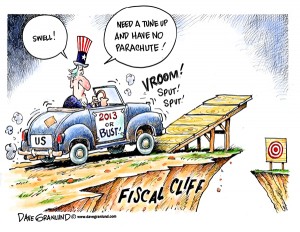In this article, Alan Greenspan discusses how he would prefer a “modest” recession in order to lower the US deficit by raising taxes.
Finally! I am simply amazed at the fact that after many years the US government realizes that it must spend an amount equal to or less than its total revenues; it is a simple fact known by most elementary school students. As mentioned in the article, the US has been adding nearly a trillion dollars to its debt yearly, bringing the debt to be $16.1 trillion, which is unhealthy for the US economy in the long run. Yet, what Alan Greenspan proposes is completely ridiculous. Raise taxes? Risk another global recession? No thanks. One shouldn’t look so far ahead that they fall into a hole right in front of them. Raising taxes will increase unemployment which will lead the US’s economy back into a recession, and the rest of the world will follow suit.
The solution?
Firstly, giving tax breaks to corporations (and individuals) doesn’t always translate into higher rate of employment as firms simply pocket the profits and don’t raise production. On the other hand, tax hikes always result in increased unemployment. Therefore, a viable solution would be to get rid of corporate subsides and tax breaks which will make firms more efficient and will lower major US government expenses at the same time.
References:
Carmichael, Kevin. “Greenspan: Recession a ‘cheap Price’ to Pay to Fix U.S. Debt.”Theglobeandmail.com. The Globe and Mail, 16 Nov. 2012. Web. 16 Nov. 2012. <http://www.theglobeandmail.com/report-on-business/economy/economy-lab/greenspan-recession-a-cheap-price-to-pay-to-fix-us-debt/article5369498/>.
Photo Credits:
Granlund, Dave. Fiscal Cliff Cartoon. N.d. Photograph. Www.davegranlund.com.Http://simple-politiks.com. SimplePolitiks, 28 Aug. 2012. Web. 18 Nov. 2012. <http://simple-politiks.com/2012/08/28/what-is-the-fiscal-cliff/>.



